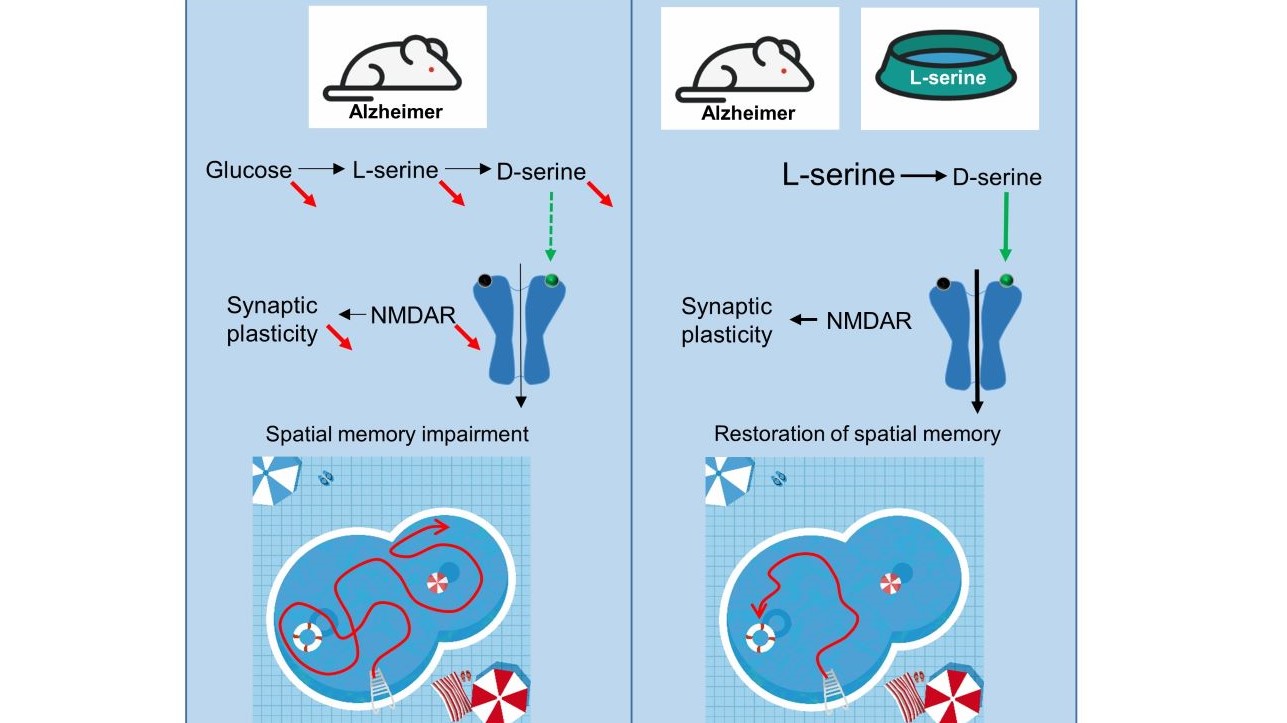The brain consumes a large part of the energy available in
our body. Its proper functioning is based on close cooperation between neurons
and the cells in their environment, particularly the astrocytes. The early
stage of Alzheimer's disease is characterized by a reduction in this energy
metabolism, but it is not known whether this deficit can contribute directly to
the cognitive symptoms of Alzheimer's disease.
A collaborative study, led by Gilles Bonvento's team at the
LMN (MIRCen) and the Neurocentre Magedie (INSERM), has shown in a mouse model
of Alzheimer's disease that a decrease in glucose consumption by astrocytes
leads to a reduction in the production of L-serine, an amino acid produced
mainly by these cells in the brain and whose biosynthesis pathway is altered in
patients.
Astrocytes are brain cells, known as glial cells, which
support neurons, but which are now known to perform a range of key functions
regulating the transmission of information in the brain. Through the blood
vessels with which they are connected, astrocytes collect glucose before
transforming it into various metabolites, including the amino acid L-Serine,
the precursor of D-Serine. D-Serine acts as a 'gliatransmitter' in the
hippocampus where, once released at the synapses, it binds to the neuronal NMDA
receptors, which play an essential role in learning and memory.
Therefore, by producing less L-serine, astrocytes cause a decrease in the activity of these receptors, leading to an alteration in neuronal plasticity and associated memory capacities. The scientists also demonstrated that the memory functions of the mice were all restored by dietary intake of L-serine.

In mice genetically modified to model Alzheimer’s disease, there is low serine production and less activation of NMDA receptors, resulting in decreased synaptic plasticity and spatial memory (left). Plasticity and spatial memory performance are restored in these mice after a serum-enriched diet (right). (Credit: G. Bonvento/LMN/Mircen)
The identification of the role of L-serine in cognitive
impairment and the experimental efficacy of nutritional supplementation are
paving the way for new strategies, complementary to drug therapies, to combat
the early symptoms of Alzheimer's disease and other diseases with altered brain
metabolism, such as Parkinson's or Huntington's disease.
-> These results have been shared through a press release.
This work was carried out by researchers from the Laboratory of Neurodegenerative Diseases (CNRS/CEA/University of Paris-Saclay), within the MIRCen/François Jacob Institute of Biology, and the Neurocentre Magendie (Inserm/University of Bordeaux) in collaboration with teams from the Neurosciences Paris Seine Laboratory (CNRS/Inserm/Sorbonne University), of the Institut Galien Paris Sud (CNRS/University Paris Saclay), the Lyon Neuroscience Research Centre (CNRS/Inserm/University Claude Bernard Lyon 1/University Jean Monnet), the Department of Medicines and Technologies for Health of the Fréderic Joliot Institute of Life Sciences (CEA/Inrae/University Paris Saclay) and by AP-HP researchers at the Pitié-Salpétrière Hospital).
This work was supported by the France Alzheimer association, the Fondation de France, the Foundation for Medical Research, the Alzheimer Foundation and the National Biology and Health Infrastructure NeurATRIS.